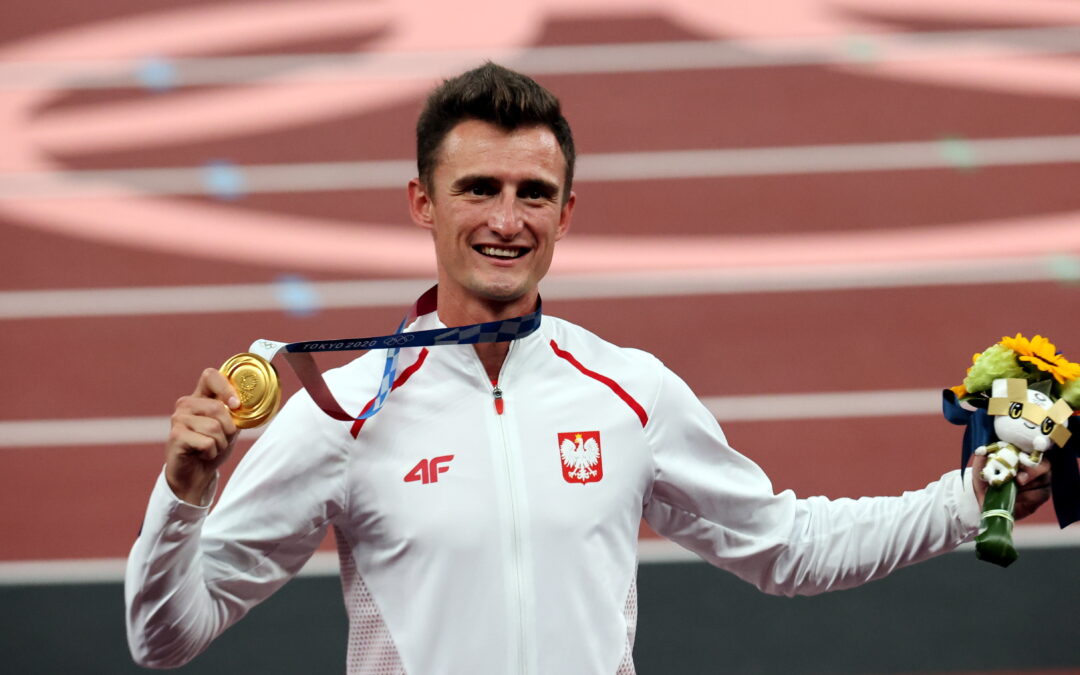One of the surprise successes at the Tokyo Olympics – Polish athlete Dawid Tomala, who won gold in the 50 km walk – is set to be offered a sponsorship deal following the intervention of Poland’s prime minister.
Tomala has spoken of the difficulties he has faced in pursuing his athletics career, including working on a building site while being trained for free by his father. At one stage, the 31-year-old almost quit the sport due to a lack of funding.
Prior to this summer’s success, Tomala’s only international medal came at the European Under-23 Championships in 2011, where he initially won silver in the 20 kilometre walk but was four years later upgraded to gold after the Russian winner was found to be a drugs cheat.
Before qualifying for Tokyo, Tomala had never competed at 50 km distance but decided to switch because he said he was “bored” with 20 km. He then won his event with a dominant display, leading from around the halfway mark and finishing over half a minute ahead of Germany’s second-place Jonathan Hilbert.
Dawid Tomala z AZS Politechnika Opolska Mistrzem Olimpijskim w chodzie na 50 kilometrów! 🇵🇱🥇🇵🇱Reprezentant Polski zdeklasował rywali na trasie Sapporo Odori Park.
Drugi był Niemiec J.Hilbert, trzeci Kanadyjczyk E. Dunfee. #DawidTomala #MistrzDawidTomala #ZłotyTomala #Tokyo2020 pic.twitter.com/48YM3ywTuN— Bartosz Piekarski (@BartekPiekarsky) August 6, 2021
Following his victory, Tomala spoke to the Polish media about the challenges he has had to overcome to reach his goal.
“A few years ago, after [winning] a gold medal in the Polish championships, I gave up training for a few months,” he told Wirtualna Polska. “I just went to work because I had no money to live on. I worked full time a construction site; I was a PE teacher, a masseur.”
Even when competing, he would still spend the off-season working in construction. “Sometimes it was so tough that I didn’t have the strength for anything,” Tomala said in an interview with Przegląd Sportowy. “I fell asleep in my clothes because I was so exhausted.”
Belarusian athlete Krystina Tsimanouskaya has landed in Poland, whose government has provided her and her husband with humanitarian visas after she claimed that Belarus tried to force her to return from #tokyo2020 against her will https://t.co/dHjHXaDjhi
— Notes from Poland 🇵🇱 (@notesfrompoland) August 5, 2021
However, this year Tomala decided to “take the risk” and “give up all outside activities to concentrate only on the games”. A grant allowed him to “make ends meet, though barely”. His father, who trained him for free, was unable to travel to Japan due to COVID-19 restrictions.
Asked by Przegląd Sportowy about his 120,000 zloty (€26,000) bonus for winning Olympic gold, he said he raced “out of passion” but that “it was nice, after so many years”. “Probably none of the walkers do it for the money, because when it comes to earnings, we are right at the bottom,” he said.
On Sunday, Poland’s prime minister, Mateusz Morawiecki, announced that after hearing Tomala’s story – which reads “like a movie script” – he had asked Totalizator Sportowy, a state-owned gambling firm, to sponsor the athlete.
“His great optimism had infected millions of people, although his path to the top was not easy,” wrote Morawiecki alongside a photo of Tomala with his medal in front of the logo of his new sponsor. “We want his fantastic sports story to continue, but without the need to earn money after training [to afford] his sporting passion.”
Tomala will be unable to defend his title at the next games in Paris, as the 50 km walk is not scheduled to be held there, meaning the Pole may be the last ever Olympic champion at that distance. Instead, the 2024 games is likely to feature a 35 km walk.
Speaking to Przegląd Sportowy, Tomala said that he is happy “to take whatever life brings: if there is a new competition at 35 km instead of 50 km, it will be a new challenge again…Maybe it will be even better [for me]”.
Poland enjoyed a relatively successful Tokyo Olympics, with its joint-highest medals total since the 1996 games. Polish athletes brought home 14 medals in total, including four golds, coming 17th among all competing countries.
The Polish Olympic Committee will be paying out 2.2 million zloty (€481,000) in total as bonuses to the country’s medal-winning athletes, reports Wirtualna Polska.
Poland's Anita Włodarczyk has won hammer throw gold at the third Olympics in a row, the first time any athlete has done that in the discipline for over a century.
Malwina Kopron took bronze, bringing Poland's medal total to six at #tokyo2020 https://t.co/fbDwo3aGbt
— Notes from Poland 🇵🇱 (@notesfrompoland) August 3, 2021
Main image credit: Kuba Atys / Agencja Gazeta

Daniel Tilles is editor-in-chief of Notes from Poland. He has written on Polish affairs for a wide range of publications, including Foreign Policy, POLITICO Europe, EUobserver and Dziennik Gazeta Prawna.



















